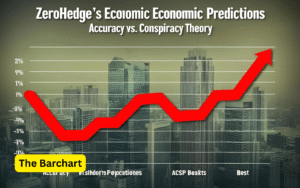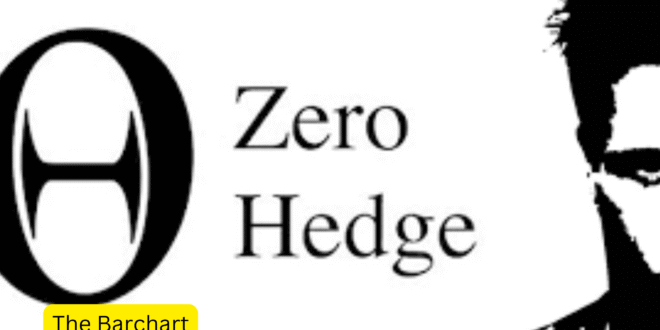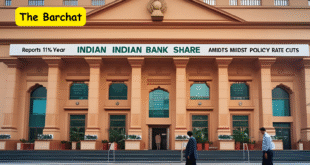ZeroHedge, the financial and political blog known for its critical and often contrarian views on the economy, markets, and geopolitical events, has gained a significant following.
It provides unique perspectives, some of which challenge the mainstream narratives in financial journalism.
As we move toward 2025, ZeroHedge has outlined several key trends that could shape the global economy and markets.
In this article, we explore the core themes of ZeroHedge’s analysis and what investors and policymakers should expect from the markets in the coming years.
ZeroHedge Analysis: The Future of Global Markets in 2025
ZeroHedge has long been known for its skepticism towards traditional economic models and its bearish stance on the global financial system.
As we approach 2025, ZeroHedge predicts a challenging environment for investors, with numerous risks to global stability.
The blog highlights concerns about asset bubbles, government debt, and the continued reliance on central banks to prop up the financial system.
It foresees significant volatility in global markets, with the potential for major corrections in stocks, bonds, and commodities.
One of the central themes in ZeroHedge’s 2025 outlook is the potential for a “global reset” in financial markets.
This could include a shift away from the U.S. dollar as the world’s reserve currency, driven by geopolitical tensions and alternative currency systems like digital assets.
Furthermore, ZeroHedge’s analysis points to the growing risks associated with the massive levels of debt, both public and private, which could trigger financial crises in several regions, including Europe and Asia.
How ZeroHedge Predicted the Crypto currency Boom

ZeroHedge has been an outspoken advocate for cryptocurrency, particularly Bitcoin, as a hedge against the failing global financial system.
Over the past decade, the blog has consistently warned about the risks of inflation and currency devaluation, predicting that cryptocurrencies could play a major role in the future of finance.
ZeroHedge’s belief in the potential of decentralized currencies has proven prescient, as cryptocurrencies like Bitcoin and Ethereum have surged in value, attracting mainstream attention.
In its early coverage of digital currencies, ZeroHedge emphasized the role of blockchain technology and the need for a decentralized financial system.
This view was met with skepticism from many financial institutions and policymakers.
However, as cryptocurrency adoption has grown, with Bitcoin reaching new all-time highs and institutions such as Tesla and Square adding Bitcoin to their balance sheets, ZeroHedge’s predictions appear increasingly accurate.
The blog’s ongoing coverage of the crypto space continues to be cautious yet optimistic, highlighting the risks posed by government regulation and the potential for massive volatility.
However, ZeroHedge remains bullish on the long-term prospects of cryptocurrencies, seeing them as an essential part of a new financial order in the years to come.
Understanding ZeroHedge’s View on the U.S. Stock Market
ZeroHedge has been highly critical of the U.S. stock market, particularly its reliance on artificial support from the Federal Reserve.
Over the years, the blog has warned that the stock market is disconnected from the real economy, driven largely by central bank interventions such as low interest rates, quantitative easing, and fiscal stimulus packages.
According to ZeroHedge, this has created a bubble that is ripe for bursting.
In 2025, ZeroHedge predicts that the U.S. stock market will face significant challenges.
Rising inflation, potential corporate debt defaults, and geopolitical instability are all seen as major risks to the stock market’s stability.
The blog has repeatedly pointed out that the S&P 500 and other major indices are trading at historically high valuations, which could lead to a significant correction once the artificial support from the Fed and other central banks starts to wane.
However, ZeroHedge also acknowledges that the U.S. stock market could remain buoyed in the short term by continued monetary policy interventions and the growth of technology stocks.
As a result, investors may face a difficult balancing act, trying to navigate the risks of overvaluation while still benefiting from the ongoing bull market in certain sectors.
ZeroHedge’s Take on Rising Global Inflation
Inflation has become one of the most discussed topics in financial circles in recent years, and ZeroHedge has been a vocal critic of central bank policies that it believes are fueling inflationary pressures.
The blog argues that the unprecedented levels of money printing by central banks, combined with supply chain disruptions and geopolitical tensions, will lead to higher inflation in the years to come.
ZeroHedge warns that inflation will not be temporary, as many mainstream economists have suggested.
Instead, it believes that the current inflationary environment is a result of structural changes in the global economy, including rising commodity prices, the decoupling of global supply chains, and a shift away from the dollar.
As inflation continues to rise, ZeroHedge suggests that asset classes like gold and cryptocurrencies will become increasingly attractive to investors seeking to hedge against the eroding purchasing power of fiat currencies.
The blog also cautions that rising inflation could lead to social and political unrest, as governments and central banks struggle to manage the economic consequences.
The blog’s predictions about inflation align with broader concerns in the financial community about the long-term implications of current monetary policies.
Will the Federal Reserve’s Actions Trigger Another Economic Crisis?
ZeroHedge has been particularly critical of the U.S. Federal Reserve’s actions over the past decade, especially in response to the 2008 financial crisis.
The blog argues that the Fed’s policies of low interest rates, quantitative easing, and bailout programs have only postponed the inevitable economic collapse, creating a system of “too big to fail” institutions that rely on government intervention to survive.
Looking ahead to 2025, ZeroHedge fears that the Fed’s continued manipulation of interest rates and bond markets could trigger another economic crisis.
As the U.S. economy grapples with rising debt levels, the potential for a Fed-induced market correction increases.
ZeroHedge believes that when the Fed eventually raises interest rates or halts its bond-buying programs, it will expose the vulnerabilities of an economy built on cheap money.
Moreover, the blog predicts that the next financial crisis could be more severe than the 2008 crash, as the global economy is now more interconnected and dependent on debt.
The Fed’s policies, according to ZeroHedge, have created a fragile financial system that could collapse under the weight of its own artificial support.
ZeroHedge: A Critical Perspective on U.S. Fiscal Policy
ZeroHedge has been highly critical of U.S. fiscal policy, particularly the country’s ever-growing national debt.
The blog argues that the U.S. government’s reliance on borrowing to fund its spending has created a ticking time bomb for the economy.
ZeroHedge warns that the U.S. government’s fiscal irresponsibility could have dire consequences in the future, leading to higher taxes, inflation, and a devaluation of the U.S. dollar.
As we approach 2025, ZeroHedge predicts that the U.S. will continue to face fiscal challenges, including rising entitlement spending, military expenditures, and the costs associated with climate change and healthcare.
The blog suggests that the U.S. will eventually face a reckoning, with either a fiscal crisis or a shift towards austerity measures that could have significant social and economic repercussions.
The Rise of Geopolitical Tensions: ZeroHedge’s Perspective on Asia and the Middle East
Geopolitical tensions have been rising across the globe, and ZeroHedge has closely followed these developments, particularly in Asia and the Middle East.
The blog highlights the growing rivalry between the U.S. and China, as well as the ongoing conflicts in the Middle East, as key sources of global instability.
ZeroHedge warns that these geopolitical risks could have a profound impact on global markets, leading to supply chain disruptions, rising commodity prices, and military conflicts that could threaten the global economy.
In 2025, ZeroHedge anticipates that the U.S.-China trade war will continue to escalate, with both nations seeking to assert their dominance in global trade and technology.
The Middle East remains a hotbed of volatility, with tensions between the U.S. and Iran, as well as ongoing conflicts in Syria and Yemen, threatening to destabilize the region further.
ZeroHedge’s analysis suggests that these geopolitical risks will continue to weigh on global markets in the years to come.
The Truth Behind ZeroHedge’s Controversial Predictions
ZeroHedge is often criticized for its controversial and, at times, alarmist predictions.
However, the blog’s track record of accurately forecasting major financial events has earned it a dedicated following among those who are skeptical of mainstream financial reporting.
Critics argue that ZeroHedge’s pessimistic outlook is too extreme, while supporters believe that its analysis provides a much-needed alternative to the optimistic narratives put forth by traditional financial media.
As we look ahead to 2025, it is clear that ZeroHedge’s predictions have often been more accurate than many gave them credit for.
Whether it’s predicting the cryptocurrency boom or warning about the dangers of excessive government debt, ZeroHedge has proven to be a unique voice in the financial world, offering an alternative perspective on the global economy.
ZeroHedge and the Collapse of the Bond Market: What to Expect
The bond market has long been a critical pillar of the global financial system.
However, ZeroHedge has raised alarms about the fragility of this market, particularly in the wake of the massive amounts of debt being issued by governments and corporations around the world.
The blog has warned that the bond market is currently in a bubble, driven by central bank policies such as low interest rates and bond-buying programs.
ZeroHedge’s analysis suggests that by 2025, the bond market could experience a significant collapse, especially if inflation continues to rise or if central banks start to unwind their bond purchases.
A sharp rise in interest rates could lead to a massive sell-off in government and corporate bonds, causing bond prices to plummet and yields to spike.
The blog’s critics argue that such a scenario is unlikely, given that central banks have shown a willingness to intervene in markets to maintain stability.
However, ZeroHedge believes that the long-term risks of an over-leveraged bond market are too great to ignore.
As we move toward 2025, investors may need to rethink their bond allocations and consider safer, alternative assets.
How ZeroHedge Addresses the Global Debt Crisis
One of the most pressing issues that ZeroHedge consistently highlights is the global debt crisis.
According to the blog, the world is facing an unprecedented level of debt, both public and private, which threatens to destabilize the global financial system.
From the U.S. government’s massive fiscal deficit to the increasing corporate debt in China, ZeroHedge warns that debt levels have become unsustainable.
In 2025, ZeroHedge believes that the global debt crisis will come to a head, potentially triggering a series of defaults, bankruptcies, and financial collapses.
The blog argues that central banks and governments are unlikely to be able to print or borrow their way out of this crisis.
Instead, the world will face difficult choices, such as debt restructuring, austerity measures, and potentially even a new global currency system.
ZeroHedge suggests that the solution to the debt crisis lies in reducing the global reliance on debt-driven growth.
This could involve structural reforms to the financial system, including a return to sound money principles and a move away from the current fiat currency system.
However, given the entrenched interests of financial elites and the power of central banks, such a shift seems unlikely in the near term.
Is ZeroHedge an Alternative to Mainstream Financial Media?
As traditional financial media continues to promote a largely optimistic view of the global economy, ZeroHedge has positioned itself as a critical alternative voice.
The blog’s often contrarian and bearish views challenge the conventional narratives espoused by mainstream outlets like CNBC, Bloomberg, and the Wall Street Journal.
While ZeroHedge has its share of critics, many readers appreciate its focus on issues that are often overlooked or downplayed by mainstream financial media.
The blog covers topics such as the dangers of excessive debt, the risks of central bank intervention, and the potential for geopolitical instability, providing a broader and more nuanced view of the global economy.
In the context of 2025, ZeroHedge’s role as an alternative to mainstream media will likely become even more important.
As the financial system continues to show signs of strain, readers may increasingly turn to ZeroHedge for insights that go beyond the surface-level analysis often found in traditional financial reporting.
Whether you agree with its conclusions or not, ZeroHedge forces its readers to think critically about the economic and financial forces shaping our world.
What ZeroHedge Got Right About the COVID-19 Economic Impact
In early 2020, as the COVID-19 pandemic began to take hold, ZeroHedge was among the first to warn about the economic fallout from the crisis.
While mainstream media outlets initially downplayed the potential economic consequences, ZeroHedge was quick to point out that the pandemic would likely lead to a global recession, massive unemployment, and significant disruptions in the supply chain.
Looking back, it is clear that ZeroHedge’s predictions about the economic impact of COVID-19 were largely accurate.
The pandemic led to a severe contraction in global GDP, with millions of people losing their jobs and entire industries being upended.
Central banks and governments responded with unprecedented monetary and fiscal stimulus measures, which have had both positive and negative consequences for the global economy.
ZeroHedge also highlighted the risks of inflation that could emerge from the massive levels of money printing.
As we approach 2025, inflation remains a concern, with rising commodity prices and supply chain issues contributing to higher costs for consumers.
While some mainstream economists continue to downplay inflation risks, ZeroHedge’s early warnings appear increasingly prescient.
ZeroHedge’s Warning on the Future of Central Bank Digital Currencies (CBDCs)
ZeroHedge has been a vocal critic of central bank digital currencies (CBDCs), warning that they represent a significant threat to individual freedom and privacy.
CBDCs are digital versions of national currencies issued and controlled by central banks, and they have been gaining traction as governments look for ways to modernize their financial systems and increase their control over monetary policy.
ZeroHedge has expressed concern that CBDCs could be used as a tool for surveillance and social control, allowing governments to monitor every transaction and potentially limit people’s access to their own money.
The blog has also raised alarms about the risks of hyperinflation and currency devaluation that could accompany the introduction of digital currencies, especially in economies that are already struggling with debt and inflation.
Looking ahead to 2025, ZeroHedge predicts that CBDCs will become more widespread, with several major economies rolling out their own digital currencies.
While some see CBDCs as a potential solution to financial inclusion and efficiency, ZeroHedge remains cautious, warning that the long-term consequences of digital currency systems could be far-reaching and dangerous.
The Role of ZeroHedge in Shaping Public Opinion on Global Economic Events
Since its inception, ZeroHedge has played a significant role in shaping public opinion on global economic events.
Through its critical analysis and alternative viewpoints, the blog has attracted a dedicated following of readers who are skeptical of mainstream financial media and government narratives.
ZeroHedge’s ability to identify emerging risks and provide alternative perspectives has made it a go-to source for many investors, economists, and political analysts.
In the lead-up to 2025, ZeroHedge’s influence is expected to grow, as more people turn to independent sources of financial information.
The blog’s focus on issues like debt, inflation, and the risks of central bank intervention resonates with those who feel that the traditional financial media is too focused on short-term gains and market manipulation.
As global economic instability increases, ZeroHedge will likely continue to shape public discourse and provide a voice of dissent in an increasingly uncertain world.
ZeroHedge’s Economic Predictions: Accuracy vs. Conspiracy Theory

One of the main criticisms of ZeroHedge is that its predictions often veer into the realm of conspiracy theory.
Critics argue that the blog’s apocalyptic outlook on the global economy and its frequent warnings of financial collapse can sometimes be overly dramatic and unfounded.
However, supporters of ZeroHedge argue that the blog’s analysis is grounded in reality, offering a much-needed counterpoint to the mainstream financial media’s overly optimistic forecasts.
As we approach 2025, it is clear that many of ZeroHedge’s warnings have proven to be more accurate than critics initially believed.
From predicting the impact of the COVID-19 pandemic to forecasting rising inflation and market volatility, ZeroHedge has often been ahead of the curve in identifying risks to the global economy.
While some of its more controversial predictions may not come to pass, the blog’s ability to challenge conventional wisdom and encourage independent thinking remains an essential part of the financial landscape.
Conclusion
ZeroHedge has long been a unique voice in financial media, providing critical and often contrarian perspectives on the global economy, markets, and geopolitics.
As we look toward 2025, the blog’s analysis of rising debt levels, market volatility, and geopolitical tensions offers valuable insights for anyone seeking to navigate an increasingly uncertain world.
While some of its predictions may be controversial, ZeroHedge has consistently demonstrated a keen understanding of the risks and challenges facing the global financial system.
Whether you agree with its conclusions or not, ZeroHedge’s role as an alternative to mainstream financial media has become more important than ever.
In a world where traditional financial institutions and media outlets often prioritize optimism and short-term gains, ZeroHedge provides a critical and independent perspective on the forces shaping our economic future.
As we move forward, its warnings and predictions will continue to resonate with those who seek a deeper understanding of the risks and opportunities that lie ahead.




